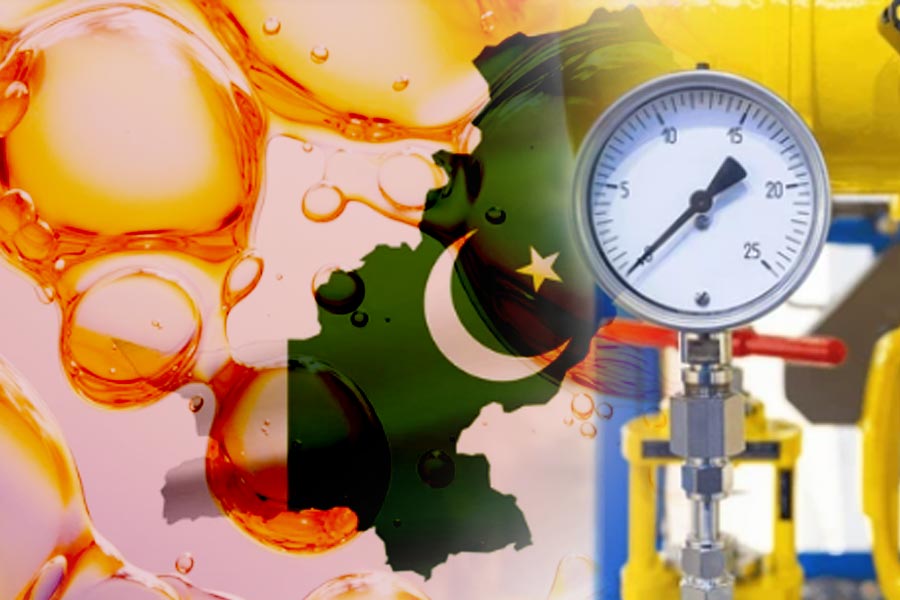A three-year survey was undertaken in collaboration with a friendly country to verify the presence of the oil and gas reserves
PTI
Islamabad
Published 07.09.24

A substantial deposit of petroleum and natural gas has been discovered in Pakistan’s territorial waters, a cache so large its exploitation could change the country’s destiny, according to a media report.
A three-year survey was undertaken in collaboration with a friendly country to verify the presence of the oil and gas reserves, DawnNewsTV quoted a senior security official as saying on Friday.
The geographic survey has allowed Pakistan to identify the location of the deposits, and the relevant departments have informed the government of the resources found in Pakistani waters.
Terming it an effort to benefit from what he called the ‘blue water economy’, the official said that proposals for bidding and exploration were being studied, meaning that the exploration work can be started in the near future.
However, he said the work of digging wells and actually getting oil out could take several years.
But the ‘blue water economy’ can yield more than just oil and gas; there are several other valuable minerals and elements that can be mined from the ocean.
The official said that taking the initiative and acting quickly could help turn around the country’s economic fortunes.
Some estimates suggest that this discovery constitutes the fourth-largest oil and gas reserves in the world.
Currently, Venezuela is thought to be the leader in oil reserves with around 3.4 billion barrels, while the US has the most untapped shale oil reserves.
Saudi Arabia, Iran, Canada and Iraq constitute the rest of the top five.
While talking to DawnNewsTV, former Ogra (Oil and Gas Regulatory Authority) member Muhammad Arif said even though the country should remain optimistic, there’s never 100 per cent certainty that the reserves would be discovered as expected.
When asked if these reserves are enough to meet the country’s energy needs, he said it depends on the size and recovery rate of the production.
“If this is a gas reserve, it can replace LNG imports and if these are oil reserves, we can substitute imported oil.” However, he cautioned that it is “wishful thinking” until the prospects for the reserves are analysed and the drilling process begins.
He pointed out that exploration alone required a hefty investment of around USD 5 billion and it might take four to five years to extract reserves from an offshore location.
He said if the exploration resulted in the discovery of reserves, then further investment would be needed for wells and laying down the infrastructure to extract the reserves and produce fuel, reported Dawn.

A substantial deposit of petroleum and natural gas has been discovered in Pakistan’s territorial waters, a cache so large its exploitation could change the country’s destiny, according to a media report.
A three-year survey was undertaken in collaboration with a friendly country to verify the presence of the oil and gas reserves, DawnNewsTV quoted a senior security official as saying on Friday.
The geographic survey has allowed Pakistan to identify the location of the deposits, and the relevant departments have informed the government of the resources found in Pakistani waters.
Terming it an effort to benefit from what he called the ‘blue water economy’, the official said that proposals for bidding and exploration were being studied, meaning that the exploration work can be started in the near future.
However, he said the work of digging wells and actually getting oil out could take several years.
But the ‘blue water economy’ can yield more than just oil and gas; there are several other valuable minerals and elements that can be mined from the ocean.
The official said that taking the initiative and acting quickly could help turn around the country’s economic fortunes.
Some estimates suggest that this discovery constitutes the fourth-largest oil and gas reserves in the world.
Currently, Venezuela is thought to be the leader in oil reserves with around 3.4 billion barrels, while the US has the most untapped shale oil reserves.
Saudi Arabia, Iran, Canada and Iraq constitute the rest of the top five.
While talking to DawnNewsTV, former Ogra (Oil and Gas Regulatory Authority) member Muhammad Arif said even though the country should remain optimistic, there’s never 100 per cent certainty that the reserves would be discovered as expected.
When asked if these reserves are enough to meet the country’s energy needs, he said it depends on the size and recovery rate of the production.
“If this is a gas reserve, it can replace LNG imports and if these are oil reserves, we can substitute imported oil.” However, he cautioned that it is “wishful thinking” until the prospects for the reserves are analysed and the drilling process begins.
He pointed out that exploration alone required a hefty investment of around USD 5 billion and it might take four to five years to extract reserves from an offshore location.
He said if the exploration resulted in the discovery of reserves, then further investment would be needed for wells and laying down the infrastructure to extract the reserves and produce fuel, reported Dawn.
No comments:
Post a Comment